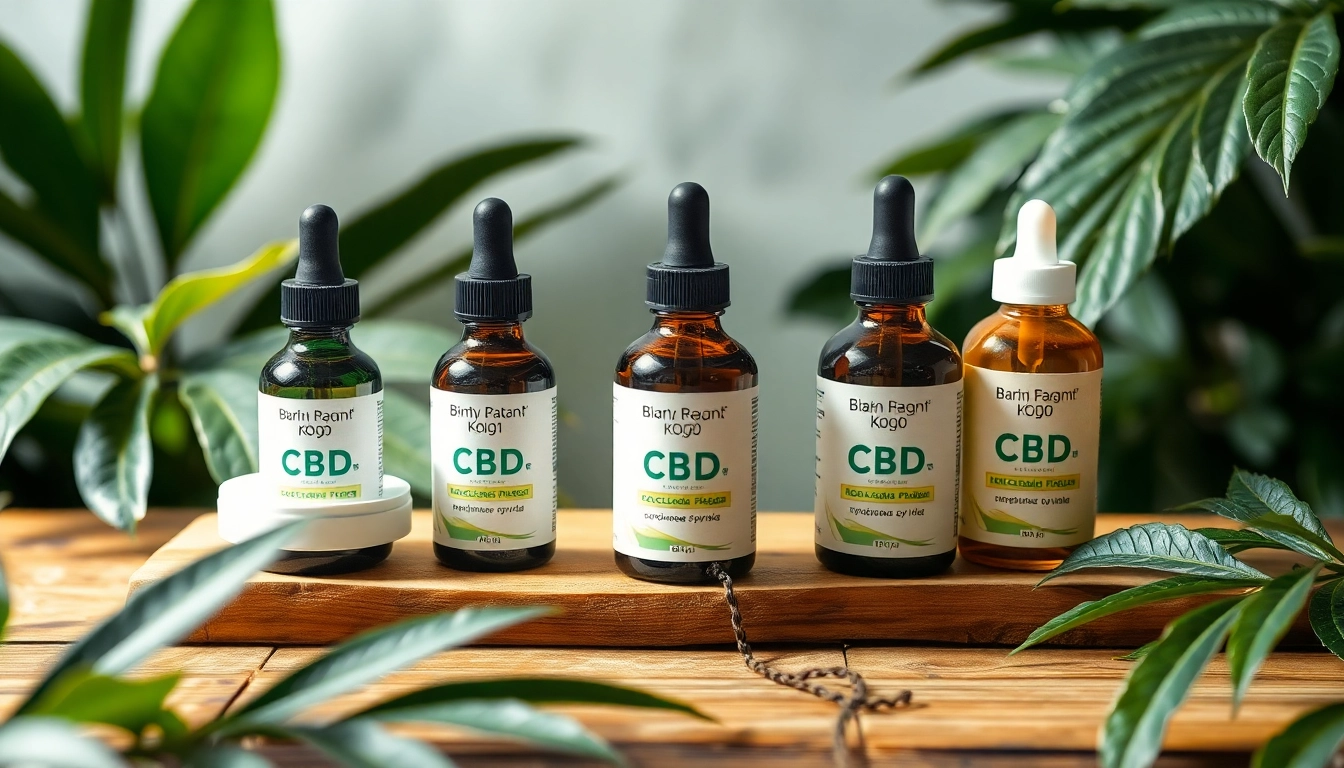Essential Guide to CBD Products: Benefits, Usage, and Quality Tips

Understanding CBD: What It Is and How It Works
As interest in natural wellness solutions continues to grow, Cannabidiol, commonly known as CBD, has positioned itself as a leading compound in the health and wellness industry. Derived from the cannabis plant, CBD offers a variety of potential benefits without the psychoactive effects typically associated with cannabis. Whether you’re new to CBD or looking to deepen your understanding, it’s essential to comprehend what CBD is, how it interacts with the body, and its legal landscape. For those seeking reliable information and high-quality products, exploring reputable sources such as CBD is a prudent first step.
Definition and Types of CBD Products
CBD is a naturally occurring cannabinoid found in the Cannabis sativa plant. Unlike THC (tetrahydrocannabinol), CBD does not induce intoxication, making it attractive for therapeutic use. CBD products come in various forms, tailored to different preferences and needs. The most common types include:
- CBD Oils and Tinctures: Concentrated extracts typically placed under the tongue for fast absorption.
- CBD Edibles: Gummies, chocolates, and capsules offering a convenient and discreet consumption method.
- Topicals: Creams, balms, and lotions infused with CBD for targeted skin or pain relief.
- Vaping Products: E-liquids and pens delivering CBD through inhalation.
- Other Forms: powders, beverages, and pet-specific products designed to meet various needs.
The Science Behind CBD and Its Effect on the Body
CBD interacts primarily with the body’s endocannabinoid system (ECS), a complex network that regulates vital functions such as mood, sleep, immune response, and pain sensation. The ECS consists of endocannabinoids (naturally produced compounds), receptors (CB1 and CB2), and enzymes responsible for synthesis and degradation.
Research suggests that CBD influences the ECS by modulating receptor activity, leading to various therapeutic effects. For example, CBD’s anti-inflammatory and anxiolytic properties are linked to its ability to influence receptor signaling pathways. While ongoing studies continue to unravel the mechanisms behind CBD’s benefits, existing evidence points to its potential in managing conditions like chronic pain, anxiety, epilepsy, and neurodegenerative diseases.
Legal Status and Regulations Surrounding CBD
The legal landscape for CBD varies significantly across countries and states. In the United States, the 2018 Farm Bill federally legalized hemp-derived CBD products containing less than 0.3% THC. However, regulations concerning manufacturing, labeling, and sale still differ by jurisdiction, affecting consumer access and product quality control.
Globally, some countries have embraced CBD, establishing comprehensive regulations, while others impose strict prohibitions. Consumers must stay informed about local laws and ensure they purchase from reputable sources that provide third-party testing and transparent labeling to guarantee safety and compliance.
Choosing the Right CBD Products for Your Needs
Factors to Consider: Potency, Form, and Quality
Selecting the appropriate CBD product hinges on understanding several key factors. Potency, measured in milligrams (mg), determines how much CBD you receive per serving. Beginners often start with lower doses (10-20 mg), gradually increasing as needed. The physical form influences absorption rates and convenience — for instance, tinctures offer swift effects, while edibles provide longer-lasting relief.
Quality is paramount; high-grade CBD products should be free from contaminants, pesticides, heavy metals, and residual solvents. To verify quality, look for products with third-party lab testing results, clear CBD and THC content labels, and reputable brand certification.
Identifying Reputable CBD Brands and Certifications
Reputable brands prioritize transparency, quality, and lab testing. Certifications such as GMP (Good Manufacturing Practices), ISO certifications, and USDA Organic labels serve as indicators of compliance with rigorous standards. Additionally, third-party test results confirming cannabinoid content and absence of harmful substances are critical for safety.
Consult reviews, industry reputation, and customer testimonials. Engage with brands that openly provide detailed product information and have a track record of consistent quality.
Common CBD Products and Their Best Uses
- CBD Oils and Tinctures: Ideal for rapid absorption and precise dosing; suitable for managing anxiety, pain, or sleep issues.
- CBD Edibles: Convenient for consistent daily use; preferred by those who dislike the taste of oils.
- Topicals: Designed for localized relief from muscle soreness or skin conditions.
- Vaping: Offers quick effects; however, long-term safety remains under review.
How to Incorporate CBD into Your Wellness Routine
Effective Dosage Tips for Beginners and Experienced Users
Starting with a low dose and gradually adjusting is recommended. Monitor your body’s response over a few days before increasing intake. Keep a journal to track effects and identify optimal dosages. Most users find that 10-30 mg per dose works well, but individual responses vary based on weight, metabolism, and condition severity.
Methods of Consumption: Oils, Edibles, Topicals, and More
Every method offers distinct advantages:
- Oils and Tinctures: Fast-acting and versatile, suitable for precise dosing and sublingual delivery.
- Edibles: Quiet, discreet, and long-lasting, ideal for sustained relief throughout the day.
- Topicals: Target specific areas for localized benefits, useful for arthritis or skin conditions.
- Vaping: Provides immediate effects but should be used cautiously due to potential lung health concerns.
Brands and Products That Promote Overall Well-being
Popular brands often formulate products with added wellness ingredients like vitamins, adaptogens, or botanicals. Look for those with transparent formulations, third-party verification, and positive customer feedback to ensure that the CBD product aligns with your overall health goals.
Monitoring and Optimizing Your CBD Experience
Tracking Effects and Adjusting Dosage
Regularly assess how CBD influences your symptoms and daily functioning. Use tracking tools or journals to record dosages, timing, and effects. Adjust your dose based on these observations, increasing gradually if needed, and always consult healthcare providers for personalized guidance.
Potential Interactions and Safety Precautions
CBD can interact with certain medications, especially those metabolized by the liver’s cytochrome P450 system. Consult your physician before starting CBD, particularly if you use blood thinners, antidepressants, or other prescription medications. Start with low doses to minimize adverse effects like fatigue or gastrointestinal discomfort.
Measuring Your Success and Long-term Benefits
Evaluate your progress periodically by noting symptom improvements, quality of sleep, mood stability, and overall wellness. Long-term use may require dose adjustments and product changes as your body adapts. Remember that CBD should complement a balanced lifestyle, including proper diet, exercise, and sleep hygiene.
Future Trends in CBD Innovation and Research
Emerging Products and Delivery Methods
Innovations include nanoemulsified CBD for enhanced bioavailability, transdermal patches for sustained release, and water-soluble formulations for better absorption. Liposomal delivery systems and novel ingestible devices are also gaining traction, offering more efficient and user-friendly options.
Latest Scientific Findings and Developments
Ongoing research continues to explore CBD’s mechanisms, therapeutic potential, and safety profile. Recent studies indicate promising roles in neuroprotection, anti-inflammatory effects, and mental health support. Regulatory agencies are updating guidelines to support responsible research and product development.
How CBD Is Shaping the Wellness Industry
CBD’s integration into mainstream health products signifies a shift toward holistic wellness approaches. It influences skincare, dietary supplements, pet health, and fitness industries, fostering innovation and expanding access to natural therapies.


